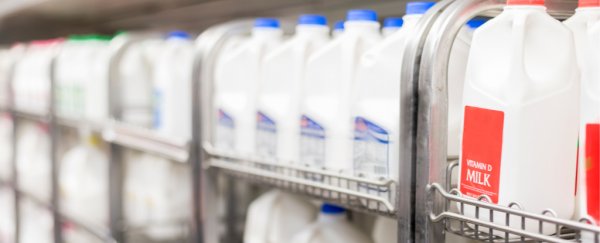The widespread adoption of pasteurisation and refrigeration means we're now used to a shelf life of two to three weeks for milk, but scientists working at Australian company Naturo just announced they've extended that to more than 60 days.
Allegedly, Naturo's technique doesn't involve the heat treatment that comes with pasteurisation, and apparently "retains its natural colour and taste like it's straight from the cow".
But there's a big caveat here - what we don't know is exactly how scientists at the company have pulled this off, presumably for confidentiality reasons.
Naturo CEO Jeff Hastings told Jennifer Nichols at ABC that the process is based on "a series of existing technologies".
"Pasteurisation is a fairly aggressive process – 72 degrees Celsius [162 degrees Fahrenheit] it is heated to, held there for 15 seconds – and for homogenised milk it's then further roughly handled, if you like, through a process called homogenisation," Hastings told ABC.
"We don't do those things."
According to Naturo, its milk has an advantage over long-life UHT milk too: matching the longevity but keeping the fresh milk taste as well.
We don't just have to take Naturo's word for it though. The new milk treatment has been approved by government agency Dairy Food Safety Victoria, and meets the required standards for killing off pathogenic microorganisms.
"We've verified that information, that the process that they've come up with achieves that outcome," the agency's Andrew Wilson told ABC. "That is, that it's equivalent to or actually better than pasteurisation."
The new process is apparently heat-free, but able to kill off more pathogens than pasteurisation – including Bacillus cereus, which pasteurisation doesn't always remove. It also retains useful enzymes and vitamins, including B2 and B12.
That makes the milk healthier for us as well as giving it a longer life – which could help cut down on food waste, besides the other advantages.
Naturo previously developed a process based around air pressure that preserves avocados and stops them turning brown, so it's possible that the new milk procedure is along similar lines.
If the company really is getting milk to last for a minimum of 60 days in the fridge, it opens up a whole new range of markets for farmers, who'll be able to export their milk much further afield without the fear of it going off. It also means slower, cheaper and more eco-friendly forms of transport can be used to distribute it.
The next step is to set up a pilot plant in Australia, capable of producing 10 million litres (2.64 million liquid gallons) of milk a year.
"Part of what we want to want to do in setting up our pilot factory is to ensure our farmers, the suppliers of the milk, get a good return at the farm gate to give them sustainability," Hastings told ABC.
